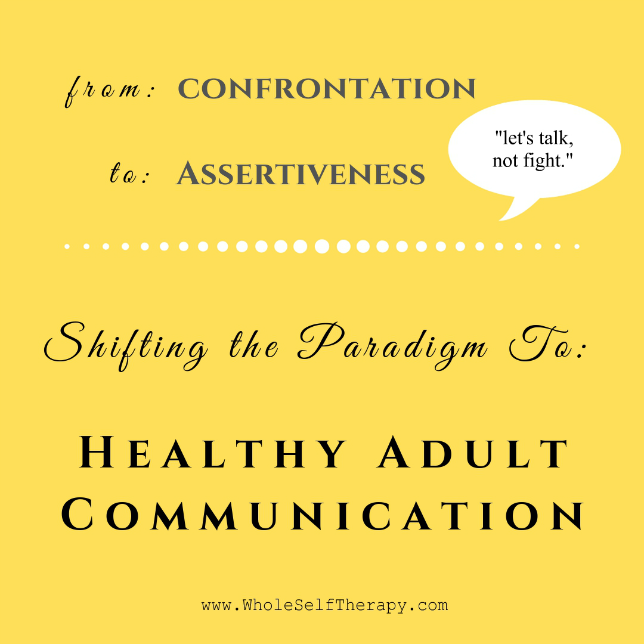Confrontation: What It Is
- To face in hostility or defiance
- To oppose
- To stand in front of/face to face
Looking these definitions for confrontation, particularly that first one, it is easy to see why so many of us “avoid confrontation at all costs,” a quote I hear regularly from my clients.
What is toxic communication?
Toxic communication includes being sarcastic or snide or using critical or demeaning language. Denying another person’s experience as the truth is also toxic. There is a special term for this called gaslighting. Being loud, using invasive body language to intimidate, or closed off body language to avoid absorbing new information are also unhealthy ways to express yourself or deny someone else the ability to share.
Another form of toxic communication is passive aggression. This is sometimes thought of as “The Silent Treatment.” Not saying what is on your mind in an effort to take control of a situation or outcome is also toxic. Withholding hurts and offenses until a specific moment in time when you feel threatened and then unleashing your pent-up feelings in an effort to absolve yourself of any wrongdoing is not only destructive, but often confusing.
It takes courage to talk about feelings, and not everyone has the skill or awareness to honor that vulnerability. Choose your audiences wisely.

Is being assertive the same thing as being aggressive?
No. Being assertive means knowing what you feel and think and communicating those thoughts and feelings in a calm, clear-headed manner while considering the well-being of the person that is listening. It allows both parties to maintain a sense of wholeness and humanness while communicating. No one person is all “right” or all “wrong.”
Sometimes, when there is a lot of emotion around the idea that we have to convey, and we are out of practice with speaking the truth in our hearts, we may struggle with being calm, per se. The first time you say something that has been weighing heavy on your heart it can be incredibly challenging to just get the words out through the emotion. Often these thoughts have been taking up space in your psyche for years. As the quote goes, “your voice may shake” and tears may fall when you begin to express what’s true.
As you practice saying what is true you will find that over time it gets easier.
Being aggressive is an entirely different animal. Aggressive communication lacks awareness, understanding and compassion for your listener’s experience. Aggressive communication can be an effort to vent anger, control another person, or establish superiority.
Being assertive is not the same thing as being aggressive or confrontative. It is a conscious way of connecting with others through conveying ideas that are important and meaningful for you. Assertiveness is the key to Healthy Adult Communication and Healthy Adult Relationships.
You can speak your truth without hostility. Some would even say that in order to enjoy emotionally satisfying relationships you must.

